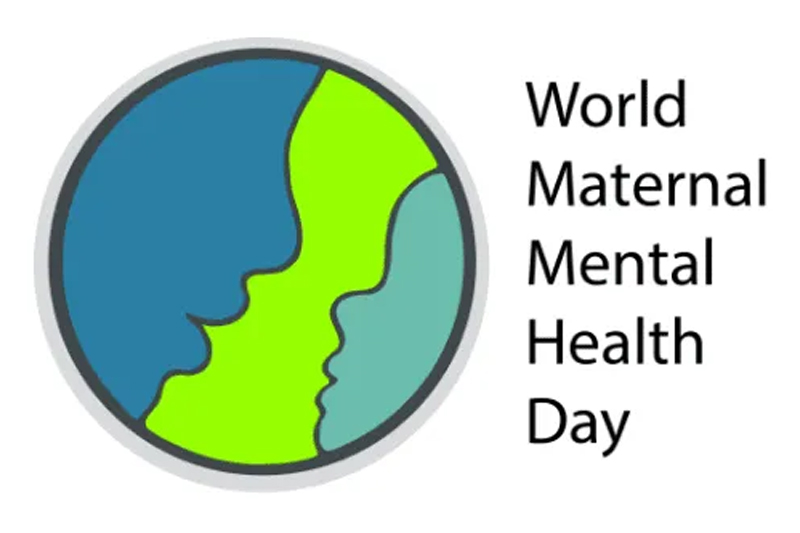May 7th is World Maternal Mental Health Day. This annual day of recognition across the globe aims to raise awareness around maternal mental health conditions, highlighting the importance of education, advocacy, prevention, and effective treatment and support for those experiencing perinatal mood and anxiety disorders (PMADs). PMADs include perinatal depression, perinatal anxiety, perinatal OCD, perinatal PTSD, and perinatal psychosis. The term “perinatal” refers to the period during pregnancy and up to one year postpartum. Despite common usage of the term “postpartum depression,” up to 50% of PMADs1 develop during pregnancy.

Maternal mental health is the number one complication associated with childbirth and a leading cause of maternal mortality in New York.2 PMADs impact at least one in five pregnant and postpartum people,3,4 with a notably higher incidence among black and brown birthing people, whereby 40% experience PMADs.5 Despite these alarming statistics, 75% of perinatal people experiencing mental illness remain undiagnosed and untreated due to shame and stigma, resulting in physical and mental health challenges for both the birthing parent and child.6 As a result, the conservative cost of untreated PMADs in the U.S. is $14 billion each year.7 In severe cases, untreated PMADs can escalate to instances of suicide and infanticide.8,9 On a macro level, untreated maternal mental health conditions not only pose a burden on the healthcare system but also strain social services, the workforce, and the school system due to the increasing number of families experiencing perinatal mental health challenges.
New York State Governor Kathy Hochul has been a staunch supporter of improving maternal health and mental health outcomes for pregnant and postpartum people over the course of her term in office. She has unveiled landmark policies for New Yorkers, including:
- Becoming the first state in the nation to create a paid leave program for prenatal care
- Providing 12 weeks of fully paid parental leave benefits to more than 80% of the state workforce
- Extending postpartum coverage for up to a full year after the end of a pregnancy for Medicaid and Child Health Plus enrollees
- Initiating a statewide Maternal Mental Health Workgroup responsible for studying and devising recommendations to improve behavioral health outcomes for new and expecting mothers and birthing people
- Initiating a state doula directory and access to doula services at no cost during pregnancy and up to 12 months postpartum for Medicaid recipients
- Signing into law stricter guidelines for postpartum mental health screenings, enabling people who just gave birth to receive early evaluations through questionnaires and talks with physicians
In honor of New York’s commitment to improving maternal mental health outcomes, the NYS Office of Mental Health (OMH) Strategic Plan for Mental Health Stigma Reduction, in partnership with Behavioral Health News, will be offering a two-part roundtable panel discussion in the Fall of 2025 titled “Mental Health Conditions in Birthing Persons and the Role of Stigma in Accessing Effective Care.” The OMH Strategic Plan for Mental Health Stigma Reduction focuses on partnering with community agencies to work towards reducing the stigma often associated with mental health conditions. Mental health stigma is one of the primary reasons why individuals do not seek help.
The first roundtable will focus on the prevalence of mental health conditions in birthing people, as well as the isolation and stigma surrounding these conditions that can prevent access to necessary supports and treatment. The second roundtable will highlight existing effective New York State programs and evidence-based interventions designed to improve maternal mental health outcomes.
These roundtables seek to reduce mental health stigma surrounding pregnancy, birth, and parenting through a multifaceted approach:
Education: By promoting accurate information about mental health conditions associated with giving birth, we can dispel harmful myths and misconceptions.
Open Conversations: By encouraging open, honest dialogue with perinatal providers, subject matter experts, and those with lived PMAD experience, we can normalize the challenges of becoming a parent and break down barriers of shame, guilt, and stigma.
Compassion and Empathy: By cultivating a culture of empathy, we can foster understanding and acceptance. When perinatal people experiencing PMADs feel understood and not judged, they are more likely to seek the help they need.
These roundtables are free and open to the New York State behavioral health workforce, policy makers, decision makers, leadership, subject matter experts, researchers, caregivers, doulas, lactation consultants, birthing people with lived PMAD experience, and anyone with a personal or professional interest in perinatal mental health. In addition, professional continuing education credits will be offered.
Please make every effort to join us and share information about the event with friends and colleagues. The better trained we are to recognize and treat maternal mental health conditions, the better equipped we are to improve outcomes for both mother/birthing person and child – and to save lives. Roundtable dates and registration information will be shared soon—stay tuned!
If you or someone you know is struggling with a PMAD, the following resources are available:
- Call or text 988 – the New York State Suicide and Crisis Lifeline for confidential mental health support and information
- Call or text 1-833-TLC-MAMA – the 24/7 National Maternal Mental Health Hotline staffed by trained counselors to listen and help
- Call 1-855-631-0001 – the Postpartum Resource Center of New York Helpline staffed 7 days a week from 9am – 5pm
- Call or text 1-800-944-4773 – the Postpartum Support International (PSI) HelpLine
- In case of an emergency, call 911 or go to the nearest emergency room for immediate assistance
Paige Bellenbaum, LCSW, PMH-C, is a Perinatal Mental Health Consultant, Educator, Advocate, Clinician, and Public Speaker, as well as an Adjunct Professor at the Silberman School of Social Work at Hunter College.
For more information about the upcoming two-part roundtable panel discussion, email Karin Wagner, PhD, Clinical Quality Initiatives, Office of Quality Improvement, Lead, OMH Strategic Plan for Mental Health Stigma Reduction, karin.wagner@omh.ny.gov.
Footnotes
- https://www.ncbi.nlm.nih.gov/books/NBK519070/
- https://www.health.ny.gov/community/adults/women/maternal_mortality/docs/2023_mmm_council_report.pdf
- Fawcett, E. J., Fairbrother, N., Cox, M. L., White, I. R., & Fawcett, J. M. (2019). The Prevalence of Anxiety Disorders During Pregnancy and the Postpartum Period: A Multivariate Bayesian Meta-Analysis. The Journal of Clinical Psychiatry, 80(4).
- Gavin, N. I., Gaynes, B. N., Lohr, K. N., Meltzer-Brody, S., Gartlehner, G., & Swinson, T. (2005). Perinatal Depression: A Systematic Review of Prevalence and Incidence. Obstetrics and Gynecology, 106(5 Part 1), 1071–1083.
- Taylor, J. and Gamble, C. (2017, November). Suffering in silence: Mood disorders among pregnant and postpartum women of color. American Progress. https://www.americanprogress.org/article/suffering-in-silence/
- Byatt, N., Levin, L. L., Ziedonis, D., Moore Simas, T. A., & Allison, J. (2015). Enhancing Participation in Depression Care in Outpatient Perinatal Care Settings: A Systematic Review. Obstetrics and Gynecology, 126(5), 1048–1058.
- Luca, Dara Lee, et al. “Financial toll of untreated perinatal mood and anxiety disorders among 2017 births in the United States.” American journal of public health 110.6 (2020): 888-896.
- Postpartum Support International, Webpage on Postpartum Psychosis
- Massachusetts General Hospital, Postpartum Psychosis Project Website.




